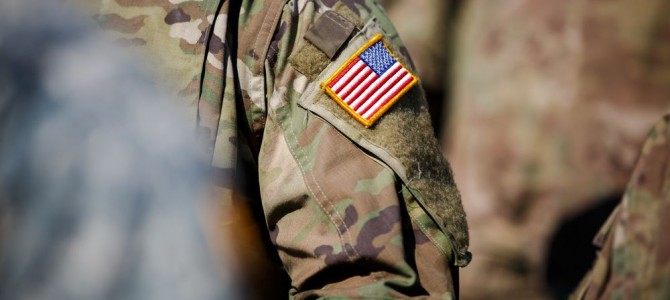
On October 23, 1983 a homicide truck bomber killed 243 Marines in Beirut, Lebanon, with a second blast killing 58 French soldiers immediately thereafter. Two days later, U.S. forces invaded the Caribbean island nation of Grenada. These two mostly forgotten military interventions during President Reagan’s first term offer lessons about applying U.S. military force today.
When I worked in the Pentagon for Secretary of Defense Caspar Weinberger during the Reagan administration, it was widely understood that the diplomats across the Potomac at the State Department were all too eager to call on the military to back up their diplomatic initiatives. The armed forces and their civilian leadership, only a decade removed from the fall of Saigon and the sting of the Vietnam War, were reluctant partners.
A year after the Beirut barracks bombing, Weinberger, an early opponent of the intervention in Lebanon, delivered what became known as the Weinberger Doctrine speech, outlining how to avoid overseas quagmires. These lessons are: only commit force to further U.S. or allied vital national interests; go in to win and with clear political and military objectives achievable with the force assigned; constantly reassess the resources needed to achieve those objectives; don’t commit force without a “reasonable assurance” of public and congressional support; and only commit U.S. troops as a last resort.
How This Criteria Could Have Forestalled Disaster
Weinberger’s advice, had it been taken, would have resulted in the United States avoiding its disastrous foray into Lebanon and the decades of unintended consequences since. In June 1982, Israel invaded Lebanon, a nation wracked with internal strife made worse by Jordan’s bloody expulsion of the Palestine Liberation Organization’s (PLO) leadership and guerilla forces some 11 years earlier. As Israeli forces advanced north, PLO chieftain Yasser Arafat was cornered in Beirut.
In August 1982, French, Italian, and U.S. forces arrived in Beirut under a United Nations (UN) peacekeeping agreement to assist in evacuating PLO forces to Tunisia. With the PLO safely out, President Reagan ordered the 800 U.S. Marines to leave Beirut, but, four days later, Lebanon’s president was assassinated and two days after that a Lebanese Christian militia associated with the assassinated president retaliated by killing between 762 and 3,500 mostly Palestinian and Lebanese Shiite civilians while the Israeli army then occupying the southern portion of Lebanon watched.
The renewed bloodshed and instability in Lebanon deepened the U.S. commitment there. But, six months later, the U.S. Embassy in Beirut was hit by bomb hidden in a delivery van, killing 63, including 17 Americans. A group called Islamic Jihad took credit for the attack, saying in a call to the local press that the attack was “part of the Iranian revolution’s campaign against imperialist targets throughout the world. We shall keep striking at any crusader presence in Lebanon, including the international forces.”
It was later determined that the Lebanese Shiite militia group Hezbollah carried out the attack on the embassy with senior Iranian officials providing direction and financing.
With the situation in Lebanon deteriorating, the Syrians and Iranians backed Hezbollah while the U.S. peacekeeping contingent provided equipment and training to the Lebanese army—a force now largely seen as a stand-in for the Lebanese Christian militia. Thus, the Marines in Lebanon lost any semblance of neutrality they may have had under the initial UN peacekeeping mission to rescue the PLO from the Israelis a year earlier.
The Marines, now under frequent Muslim sniper fire and mortar attacks, were authorized to call in air strikes and shore bombardment to protect themselves and support the Lebanese army.
Diplomatic Rules for Military Situations
But, operating under rules of engagement geared to a peacekeeping mission, the Marines were not allowed to chamber a round in their rifles “unless instructed to do so by a commissioned officer unless you must act in immediate self-defense.” More deadly crew-served weapons were to remain unloaded. As a result, when the truck bomb, later determined to have been driven by an Iranian national, careened onto the Marines’ cantonment area, the Marines couldn’t react quickly enough to defend themselves—they were disarmed by rules of engagement likely dictated by diplomatic rather than military considerations.
The French struck back against the bombing of their barracks with an airstrike on suspected Iranian Islamic Revolutionary Guard Corps (IRGC) positions. President Reagan’s advisors considered a joint assault on Iran’s eastern Lebanon headquarters in Baalbek, Lebanon, with the French. But Weinberger, having been proved right about the ill-fated intervention into Lebanon, prevailed against the mission, arguing, among other points, it was not yet certain who perpetrated the attack on the Marine barracks. The mission was scrapped.
On February 7, 1984, a little more than three months later and with wavering congressional support, President Reagan ordered the U.S. Marines to start pulling out of Lebanon. The next day, the U.S.S. New Jersey provided covering fire, lofting 288 one-ton 16-inch rounds at enemy positions east of Beirut.
Neither Iran nor their Hezbollah proxies immediately got what they wanted—free reign in all of Lebanon—as the United States sent military aid to Israel to support its ongoing occupation of much of southern Lebanon, an effort that was pared to a security strip comprising about 10 percent of the nation in 1985 that was maintained through 2000.
Some critics have argued the failure of the United States to more vigorously respond to the Beirut Marine barracks bombing led to more terror attacks on U.S. targets. But this criticism ignores Weinberger’s initial opposition to the Lebanon deployment, a mission without a clear objective that placed Marines in harm’s way. Further, such criticism fails to take into account that Islamic terror isn’t monolithic in intent, with Iranian-backed terror a tool of statecraft versus terrorist attacks from Sunni Salafists, also known as Islamists, which has been less tied to formal nation-state policies.
A Clear Contrast in Grenada
The Grenada invasion was the antithesis of the year-and-a-half-long Lebanon intervention. Operation Urgent Fury was triggered by the arrest and murder of Grenada’s Marxist revolutionary coup leader. Grenada, a Caribbean island nation, offered the Soviet Union and its allies an important beachhead as the sole English-speaking communist-controlled outpost in the Western Hemisphere. Further, with the anarchy and violence signaling a power struggle between Marxist factions, Reagan’s national security team feared an Iranian hostage-like situation with 800 American medical students enrolled at the St. George’s School of Medicine.
On October 25, 1983, only two days after the Marine barracks bombing, a joint force of U.S. Army Rangers, paratroopers, Delta Force, U.S. Marines, and Navy SEALs invaded the island along with forces from Jamaica and other Caribbean nations. The Marxist military government was overthrown and elections were held in December of the following year. U.S. forces on the island were not targeted for attack by the locals after the initial assault.
Importantly, the Grenada operation served as a powerful show of force to U.S. adversaries in the region. Surinam, a South American nation which had drifted into the communist orbit, ejected the Cuban ambassador. Communist Nicaragua, a client state of the Soviet Union, was convinced that the Grenada operation was a dry run for an invasion there. Cuba even curtailed its regional subversive activities.
The contrast between the quickly executed Grenada operation, with its specific and achievable objectives tightly linked to clear national security concerns, and the deployment to Lebanon with its frequently shifting rationale, could not be clearer.
Another Successful Military Engagement
A little less than five years later, the United States did manage to apply force to the Islamic Republic of Iran in a way that played to American strengths while emphasizing Iranian weaknesses. On April 18, 1988, the U.S. Navy executed Operation Praying Mantis in the Persian Gulf. It was the largest U.S. naval engagement since World War II.
The operation was in retaliation for Iran mining a U.S. guided missile frigate four days before. That ship had been escorting former Kuwaiti oil tankers which had been reflagged as U.S. vessels, and the captains and at least half the crew were American. After Navy divers confirmed the mines were Iranian in origin, the punitive operation was approved.
Over the course of a few hours, ten U.S. Navy ships sank an Iranian frigate and missile boat, killing 56 crew, while also sinking three armed speedboats, damaging a frigate, and destroying two militarized offshore oil platforms. On the U.S. side, a sole Cobra helicopter was lost at night with its two crew. The aircraft was later raised with no signs of battle damage to indicate that it had been shot down.
The short, violent action decisively showed the Iranian theocrats the United States was still a power to be taken seriously. Operation Praying Mantis may also be responsible for the fact that, despite numerous threats to close the Straits of Hormuz to oil traffic over the years, Iran has never tried to do so—perhaps understanding the U.S. Navy could easily brush aside such an attempted blockade.
In more recent times, the military action to oust Afghanistan’s al-Qaeda-supporting Taliban regime in 2001 had its analog in the Grenada operation. The nation-building attempt that followed closely after drifted from the script. Grenada, a commonwealth island with 325 years of first French, then British rule, had some experience with rule of law and self-governance before the U.S. invasion. Afghanistan, a fractious land of some 13 ethnic groupings, was more or less an accidental nation—an ungovernable neutral zone between two wary empires: The Russian and the British.
The 2003 Iraq invasion, although far larger than either Grenada or Lebanon, had much more in common with the 1982-84 Lebanon mission from the start, with ambiguous objectives and an uncertain and open-ended endgame.
Because American soldiers, sailors, Marines, and airmen carry out America’s military operations, sustaining U.S. public support is paramount in seeing conflicts through to a victorious conclusion. Weinberger clearly outlined a commonsense guideline for committing U.S. forces in 1984. Future administrations would do well to revisit and embrace his sage advice.









